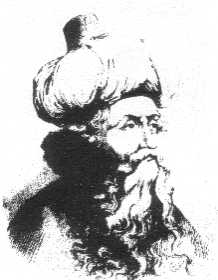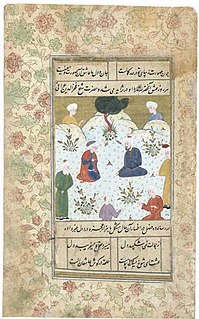
Ibn ʿArabī, nicknamed al-Qushayrī and Sulṭān al-ʿĀrifīn, was an Arab Andalusian Muslim scholar, mystic, poet, and philosopher, extremely influential within Islamic thought. Out of the 850 works attributed to him, some 700 are authentic while over 400 are still extant. His cosmological teachings became the dominant worldview in many parts of the Muslim world.

Fakhr al-Din Iraqi was a Persian Sufi poet of the 13th-century. He is principally known for his mixed prose and poetry work, the Lama'at, as well as his divan, which is mostly written in the form of a ghazal.

Ahmad al-Fārūqī al-Sirhindī (1564-1624) was an Indian Islamic scholar, Hanafi jurist, and member of the Naqshbandī Sufi order. He has been described by some followers as a Mujaddid, meaning a “reviver", for his work in rejuvenating Islam and opposing the newly made religion of Din-i Ilahi and other problematic opinions of Mughal emperor Akbar. While early South Asian scholarship credited him for contributing to conservative trends in Indian Islam, more recent works, notably by ter Haar, Friedman, and Buehler, have pointed to Sirhindi's significant contributions to Sufi epistemology and practices.

William C. Chittick is an American philosopher, writer, translator and interpreter of classical Islamic philosophical and mystical texts. He is best known for his work on Rumi and Ibn 'Arabi, and has written extensively on the school of Ibn 'Arabi, Islamic philosophy, and Islamic cosmology.

Sufism is the mystical branch of Islam. A Sufi is a Muslim who seeks annihilation of the ego in God.

Sufi philosophy includes the schools of thought unique to Sufism, the mystical tradition within Islam, also termed as Tasawwuf or Faqr according to its adherents. Sufism and its philosophical tradition may be associated with both Sunni and Shia branches of Islam. It has been suggested that Sufi thought emerged from the Middle East in the eighth century CE, but adherents are now found around the world.

Sufi metaphysics is centered on the concept of وحدة waḥdah "unity" or توحيد tawhid. Two main Sufi philosophies prevail on this topic. Waḥdat al-wujūd literally means "the Unity of Existence" or "the Unity of Being." Wujūd "existence, presence" here refers to God. On the other hand, waḥdat ash-shuhūd, meaning "Apparentism" or "Monotheism of Witness", holds that God and his creation are entirely separate.

God in Islam is the eternal being who originated the creation, preserves all things and then will resurrect all the humans. In Islam, God is conceived as absolutely one, unique, and perfect, free from all faults, deficiencies, and defects, and further held to be omnipotent, omniscient, and completely infinite in all of his attributes, having no partner or equal, and being the sole creator of everything in existence. Islam emphasizes that God is strictly singular, all-merciful and all-compassionate, whose mercy embraces everything; who neither slumbers nor sleeps, and is not vulnerable to decay or death.

Mir Sayyid Ali Hamadani was an Iranian scholar, poet and a Sufi Muslim saint of the Kubrawiya order. He was born in Hamadan, Iran and preached Islam in Central Asia and Kashmir as he travelled to practice Sufism. He died in Kashmir and was buried in Khatlan, Tajikistan in 1384 CE, aged 71–72. Hamadani was also addressed honorifically throughout his life as the Shāh-e-Hamadān, Amīr-i Kabīr, and Ali Sani.
Shaykh 'Abd al-Ghani ibn Isma′il al-Nabulsi (an-Nabalusi), was an eminent Sunni Muslim scholar, poet, and author on works about Sufism, ethnography and agriculture.

In Islamic theology, al-Insān al-Kāmil, also rendered as Insān-i Kāmil and İnsan-ı Kâmil (Turkish), is an honorific title to describe the Islamic prophet Muhammad. The phrase means "the person who has reached perfection", literally "the complete person". It is an important concept in Islamic culture of the prototype human being, pure consciousness, one's true identity, to be contrasted with the material human who is bound by their senses and materialism. The term was originally used by Sunni Sufis and is still used by them, but it is also used by Alawis and Alevis. This idea is based upon a hadith, which was used by Ibn Arabi, that states about Muhammad: "I was a prophet when Adam was between water and clay."
Dawūd al-Qayṣarī (c.1260-c.1350) was an early Ottoman Sufi scholar, philosopher and mystic. He was born in Kayseri, in central Anatolia and was the student of the Iranian scholar, Abd al-Razzaq Kāshānī.

Ṣadr al-Dīn Muḥammad ibn Isḥāq ibn Muḥammad ibn Yūnus Qūnawī [alternatively, Qūnavī, Qūnyawī],, was a Persian philosopher, and one of the most influential thinkers in mystical or Sufi philosophy. He played a pivotal role in the study of knowledge—or epistemology, which in his context referred specifically to the theoretical elaboration of mystical/intellectual insight. He combined a highly original mystic-thinker, Muḥyī al-Dīn Ibn 'Arabī, whose arcane teachings Qūnavī codified and helped incorporate into the burgeoning pre-Ottoman intellectual tradition, on the one hand, with the logical/philosophical innovations of Ibn Sīnā, on the other. Though relatively unfamiliar to Westerners, the spiritual and systematic character of Qūnawī's approach to reasoning, in the broadest sense of the term, have found fertile soil in modern-day Turkey, North Africa and Iran not to mention India, China, the Balkans and elsewhere over the centuries.
Abdullah Bosnevi (1584–1644) was a Bosnian Malamati Sufi who lived in the Ottoman period.

İsmail Hakkı Bursevî was a 17th-century Ottoman Turkish Muslim scholar, a Jelveti Sufi author on mystical experience and the esoteric interpretation of the Quran; also a poet and musical composer. İsmail Hakkı Bursevî influenced many parts the Ottoman Empire but primarily Turkey. To this day he is revered as one of the Büyükler, the great saints of Anatolia.

Shaykh Muhibullah Allahabadi, or Muhibb ullah Ilahabadi was a Sufi scholar who was active in Allahabad in northern India during the reign of the Mughul emperor Shah Jahan. He is noted as a leading proponent of the Sufi doctrine of Wahdat al-Wujud, sometimes called "Oneness of Being". Some Sufis consider that he was a saint.
The concept of the logos also exists in Islam, where it was definitively articulated primarily in the writings of the classical Sunni mystics and Islamic philosophers, as well as by certain Shi'a thinkers, during the Islamic Golden Age. In Sunni Islam, the concept of the logos has been given many different names by the denomination's metaphysicians, mystics, and philosophers, including ʿaql ("Intellect"), al-insān al-kāmil, kalimat Allāh, haqīqa muḥammadiyya, and nūr muḥammadī. Throughout Islamic history, there have existed several different metaphysical concepts that have been understood to correspond "in many respects" to the logos Christology of Christianity and to the use of the term logos in late Greek philosophy.

Michel Chodkiewicz was a French author and a scholar of Sufism, especially Akbarian teaching.
Sa'id al-Din Farghani was a Persian Sufi mystic and scholar, who is known to have composed three works.













